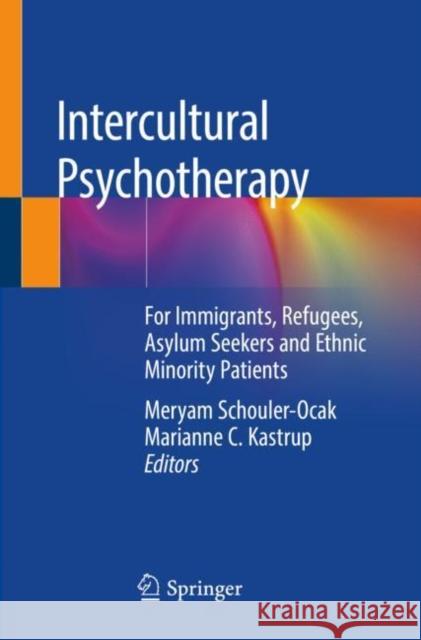Intercultural Psychotherapy: For Immigrants, Refugees, Asylum Seekers and Ethnic Minority Patients » książka



Intercultural Psychotherapy: For Immigrants, Refugees, Asylum Seekers and Ethnic Minority Patients
ISBN-13: 9783030240844 / Angielski / Miękka / 2020 / 376 str.
Intercultural Psychotherapy: For Immigrants, Refugees, Asylum Seekers and Ethnic Minority Patients
ISBN-13: 9783030240844 / Angielski / Miękka / 2020 / 376 str.
(netto: 421,70 VAT: 5%)
Najniższa cena z 30 dni: 424,07
ok. 16-18 dni roboczych.
Darmowa dostawa!
Dr. Meryam Schouler-Ocak is Professor for Intercultural Psychiatry and Psychotherapy, additionally, she is specialist for neurology, additional notation psychotherapy, particularly in trauma focused psychotherapy. She has also a certification in EMDR – Therapy and social medicine. Dr. Schouler-Ocak is working as senior physician at Psychiatric University Clinic of Charitè at St. Hedwig Hospital in Berlin, where she is the director of the out-patient clinic. Dr. Schouler-Ocak is the chair of the Research Division Intercultural Migration and Care Research, Social Psychiatry at the Charité - Universitätsmedizin Berlin. Dr. Schouler-Ocak is also the chair of the Section on Transcultural Psychiatry of the World Psychiatric Association (WPA-TPS) and of the Section on Intercultural Psychiatry, Psychotherapy and Migration of the German Association for Psychiatry, Psychotherapy and Psychosomatics (DGPPN). Furthermore, she is Board Member of the European Psychiatrists Association (EPA) and President of the Turkish-German Association for Psychiatry, Psychotherapy and Psychosocial Health (DTGPP). Additionally, she is head of the Institute of Psychotraumatology at the Alexianer Holding. Her research areas are migration and mental health, trauma, trauma-centered psychotherapy, EMDR, suicidology, transcultural psychiatry and psychotherapy.
Dr. Marianne C Kastrup is a specialist in psychiatry and the former Medical Director of the Rehabilitation and research Centre for Torture Victims, Copenhagen and has been Head of the National Competence Centre for Transcultural Psychiatry in Copenhagen. She has extensive experience in academic teaching and has been assistant professor in psychiatry, University of Copenhagen. Dr. Kastrup was for many years on the Expert Advisory Panel Mental Health, WHO and on many occasions expert advisor for European Council CPT. Currently she is the Treasurer of the World Association Social Psychiatry. In the European Psychiatric Association she has a Board member 1992-2016 and chaired the task force on refugees and migrants. In the World Psychiatric Association she has been a member of WPA Executive Committee, has chaired the Transcultural Section and chaired the Committee to Review Abuse of Psychiatry. She has more than 125 peer review articles and is author/coauthor of 24 books and more than 90 book chapters. Her research areas are traumatized refugees, transcultural psychiatry and register research.
This book is intended to sensitise psychotherapists, to strengthen practitioners’ intercultural competence and to encourage them to form psychotherapeutic relationships with people with an immigration background who are suffering from mental health problems. In this context, intercultural psychotherapy refers to the therapeutic work between psychotherapists and patients who hail from different cultural contexts, which often considerably hampers language- and culture-based understanding. In the current context of globalisation and growing crises around the world, an increasing number of people with a migration background require psychotherapeutic treatment; as a result, intercultural psychotherapy may well become the rule rather than the exception. Psychotherapists are therefore challenged to adapt to such a context. Overcoming these barriers requires certain competencies such as working with a qualified interpreter. Contributions from international experts from the field of intercultural psychotherapy provide vital insights into the theory and practice of intercultural work with patients suffering from conditions such as PTSD, depression, anxiety, personality disorders and schizophrenic disorders. These interdisciplinary specialists describe their work, share valuable lessons learned, and put forward concrete recommendations.
1997-2026 DolnySlask.com Agencja Internetowa
KrainaKsiazek.PL - Księgarnia Internetowa









